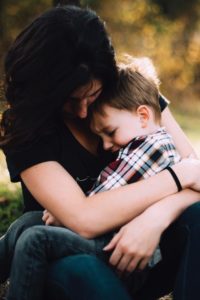The Impact of Parental Incarceration on Children
By Briana J. – Research Intern
 The effects of incarceration are not just felt by the imprisoned individual. In many cases, there are people who remain “hidden” in the criminal justice system who are impacted by incarceration. These “hidden” individuals are usually families and children of the imprisoned person. By default, children with incarcerated parents inevitably become entangled in the world of incarceration. In many situations, these children have to deal with the consequences of their parent’s imprisonment with virtually no support in understanding their situation.
The effects of incarceration are not just felt by the imprisoned individual. In many cases, there are people who remain “hidden” in the criminal justice system who are impacted by incarceration. These “hidden” individuals are usually families and children of the imprisoned person. By default, children with incarcerated parents inevitably become entangled in the world of incarceration. In many situations, these children have to deal with the consequences of their parent’s imprisonment with virtually no support in understanding their situation.
Parental incarceration has tremendous consequences and effects on a child’s development and upbringing. The problems of the prison system bleed into the lives of those indirectly affected by this system. Children can face problems surrounding their physical, emotional, financial, and educational well-being (Umamaheswar 287). This resulting separation between the child and parent after the parent’s arrest can cause a great deal of stress on both individuals. In the case of the child, their parent’s disappearance from their life is a disruption to their adolescent development. This inability to maintain a stable relationship with the imprisoned parent is detrimental to a child’s upbringing and can result in emotional trauma for the child (Cyphert 390). The inability of the parent to be in their child’s life can cause problems in how the child reacts to situations in their own life. This trauma within a child’s life could make them turn to other resources for support that could inherently cause them to resort to criminal activity. The children affected by these consequences of their parent’s incarceration sadly become essentially imprisoned and chained to this system.
 There needs to be more done to help these children with incarcerated parents. These children still indirectly have to deal with the realities of incarceration through their parent’s imprisonment. It is important that there is more research on the subject of children’s experiences with parental incarceration (Martin). This education from research can support policymakers to make decisions that address the needs of children with incarcerated parents. If there is more of an effort to support children and their families in dealing with the effects of incarceration, more children can get the help they deserve to deal with this loss and separation from their parent.
There needs to be more done to help these children with incarcerated parents. These children still indirectly have to deal with the realities of incarceration through their parent’s imprisonment. It is important that there is more research on the subject of children’s experiences with parental incarceration (Martin). This education from research can support policymakers to make decisions that address the needs of children with incarcerated parents. If there is more of an effort to support children and their families in dealing with the effects of incarceration, more children can get the help they deserve to deal with this loss and separation from their parent.
Sources
Cyphert, Amy B. “Prisoners of Fate: The Challenges of Creating Change for Children of Incarcerated Parents.” Maryland Law Review, vol. 77, no. 2, Feb. 2018, pp. 385–426. EBSCOhost,search.ebscohost.com/login.aspx?direct=true&db=a9h&AN=128769661&site=ehost-live&scope=site.
Martin, Eric. National Institute of Justice. United States Department of Justice, 1 March 2017, https://nij.ojp.gov/topics/articles/hidden-consequences-impact-incarceration-dependent-children. Accessed 4 March 2021
Umamaheswar, Janani. “Gendered Representations of Parents behind Bars: An Analysis of Newspaper Reports.” Punishment & Society, vol. 15, no. 3, July 2013, pp. 274–303. EBSCOhost, doi:10.1177/1462474513489855.